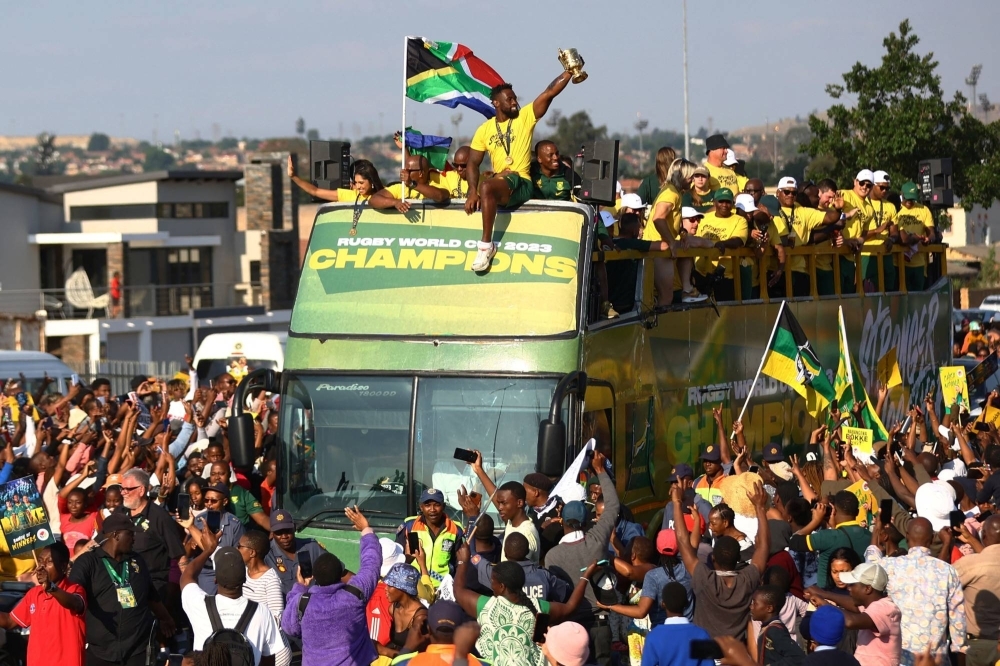These four Springboks are going to be missed.
When South Africa defeated the All Blacks from New Zealand in their final Rugby World Cup, there were probably four senior Springboks involved.
In order to defeat the All Blacks and win their fourth Rugby World Cup, the Springboks put on a brave show. It’s possible that we won’t see these four stars at the tournament again, but what an incredible journey it has been.
ARE SENIOR SPRINGBOKS GOING TO BEFORE THE RUGBY WORLD CUP?
The Rugby World Cup squad for South Africa included only four players who were born in the 1980s: Deon Fourie (37), Duane Vermeulen (37), Trevor Nyakane (34), and Willie le Roux (34). Vermeulen won Man of the Match against England in the final four years ago, and his virtuoso performance will live on in the memory of all who saw it. Fourie, a member of the utility bomb squad, went back in time to win rugby’s top honor in Paris, and he quickly established himself as a crucial impact player. It’s also unlikely that Willie le Roux or Trevor Nyakane will make a World Cup team in the following four years.
Springboks get roaring welcome in Soweto after winning World Cup

South Africa’s Soweto
On Thursday, thousands of people cheered the World Cup-winning Springboks on as they made their way through the Johannesburg township where they were once despised as part of a homecoming tour full of symbolic events.
In a thrilling final last Saturday in Paris, South Africa defeated longtime rivals New Zealand 12–11 to win a record fourth Rugby World Cup and their second consecutively.
While others, young and old, waved South African flags and yellow signs that said “thank you Bokke (Springboks),” teenagers in school uniforms danced in Soweto while they waited for the yellow and green open-top bus that would transport the players.
Dined Malise, 49, left his house a few hours ahead of the team’s planned arrival, dressed in a green and gold T-shirt, in order to secure a prime location along the route.
She exclaimed, “I’m so proud about my Bokke, especially my captain,” and then joyfully let out a joyful “Viva Bokke, Viva!”
The players rode through one of Soweto’s main streets while wearing yellow T-shirts with the team’s motto, “Stronger Together,” and supporters let out a loud cheer. Siya Kolisi, the team captain, led the crowd by holding the Webb Ellis Cup.
President Cyril Ramaphosa praised the players for bringing the nation together after it had been divided by violence when the team started its triumph tour earlier in the day in Pretoria.
In honor of the victory, Ramaphosa declared a public holiday on December 15 this week. “Saturday night, you strode off the pitch of victory and passed into legend,” the president said.
“In doing so you have lifted the spirits of an entire nation and filled us with pride.”
Black and multiracial athletes were kept in separate leagues for ninety years while White players were the only ones selected by Springbok selectors.
After democracy was established in 1994, things began to change. Nelson Mandela is well-known for having supported the team that won its first World Cup in 1995.
Sitting just outside the now-museum Soweto home where Nelson Mandela once resided, 65-year-old Vincent Mokgako observed, “This is the one time where everybody forgets whether they are Black or White.”
A social worker who was “born and bred” in the township, she said the Springboks would have faced a “hostile” reception in what was once a hub of anti-apartheid activism when the locals were “still oppressed.”
“This is this is a legacy that Mandela left, that sports always brings people together,” he continued.
Kolisi, 32, has been essential in recent years in introducing the sport to a large number of young Black South Africans.
After dedicating the trophy to “the people of South Africa,” Kolisi, the first Black Test captain for the Springboks, said, “We just wanted to show that diversity is our strength.” “We are very diverse, just like you are outside there.”
Following their 2019 victory, the Springboks “were not a thing,” saying they also went through Soweto.
Soweto, home of the Kaizer Chiefs and Orlando Pirates, two of the biggest soccer teams in South Africa, has long been known as the round ball’s domain.
However, rugby “is getting more popular by the day,” according to teacher Mkhize. She expressed her hope that after the team’s visit, rugby infrastructure would be invested in to support local kids in pursuing their dreams and dispel the myth that “rugby is not for us as Black people.”
The most recent achievement brought happiness to a country that the World Bank continues to label as the most unequal in the world, struggling with issues like unemployment, crime, and access to clean water and electricity.
“We are not happy but the Boks make us forget for a while that. … There is still a lot of people who are under poverty, who are starving around here,” Mokgako stated.
The Springboks are scheduled to visit East London on Sunday, Durban on Saturday, and Cape Town on Friday.
“The performance of the Springboks … has reminded us that even amidst our many challenges, there is always room for optimism and hope,” Ramaphosa said.


